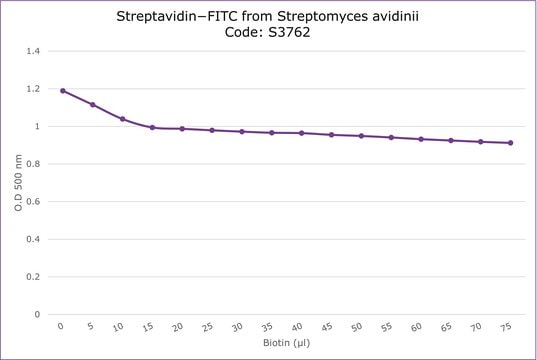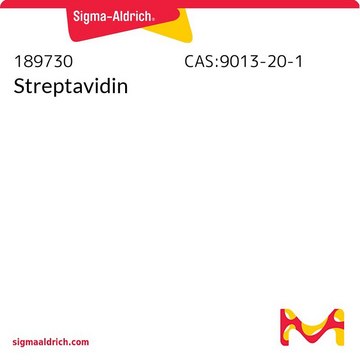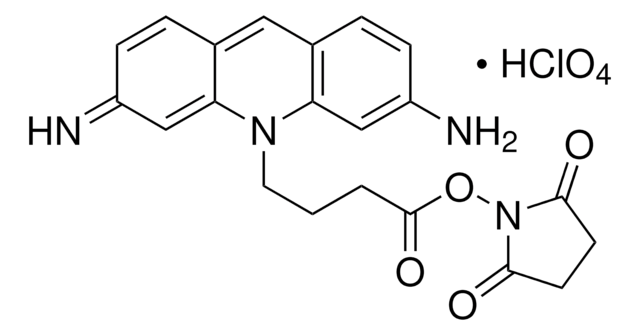Wszystkie zdjęcia(1)
Kluczowe dokumenty
40709
Atto 590-Streptavidin
BioReagent, suitable for fluorescence
Synonim(y):
Streptavidin-Atto 590
Zaloguj sięWyświetlanie cen organizacyjnych i kontraktowych
About This Item
Polecane produkty
linia produktu
BioReagent
Poziom jakości
Postać
powder
producent / nazwa handlowa
ATTO-TEC GmbH
fluorescencja
λex 590 nm; λem 619 nm in 0.1 M phosphate pH 7.0
przydatność
suitable for fluorescence
temp. przechowywania
−20°C
Zastosowanie
Atto 590 is a new label with high molecular absorption (120.000) and quantum yield (0.80) as well as sufficient stoke′s shift (excitation maximum 594 nm, emission maximum 624 nm). Atto 590 has been coupled to streptavidin to enable all kinds of assays based on the specific affinity of biotin to streptavidin. Streptavidin conjugates are used as secondary detection reagents in histochemical applications, flow cytometry, microarrays, blot analysis and immunoassays. Streptavidin conjugation of Atto 590 does not significantly change the labels spectral data regarding excitation and emission maxima. Given the optimized Dye/Protein-ratio molar absorbance and quantum yields remain high within application. Conjugates of our Atto dyes generally do not show strong fluorescence in unbound state, but fluorescence is boosted again as soon as they are bound to biotin. This may help overcome problems by unspecific binding which may sometimes appear with streptavidin based assays in special cases.
Komentarz do analizy
free of unconjugated dye
Informacje prawne
This product is for Research use only. In case of intended commercialization, please contact the IP-holder (ATTO-TEC GmbH, Germany) for licensing.
Ta strona może zawierać tekst przetłumaczony maszynowo.
Kod klasy składowania
11 - Combustible Solids
Klasa zagrożenia wodnego (WGK)
WGK 3
Temperatura zapłonu (°F)
Not applicable
Temperatura zapłonu (°C)
Not applicable
Środki ochrony indywidualnej
Eyeshields, Gloves, type N95 (US)
Certyfikaty analizy (CoA)
Poszukaj Certyfikaty analizy (CoA), wpisując numer partii/serii produktów. Numery serii i partii można znaleźć na etykiecie produktu po słowach „seria” lub „partia”.
Masz już ten produkt?
Dokumenty związane z niedawno zakupionymi produktami zostały zamieszczone w Bibliotece dokumentów.
Klienci oglądali również te produkty
Ronit Freeman et al.
Nano letters, 10(6), 2192-2196 (2010-05-21)
Semiconductor quantum dots (QDs) are used for the optical analysis of casein kinase (CK2) or the hydrolytic activity of alkaline phosphatase (ALP). Two schemes for the analysis of CK2 by a FRET-based mechanism are described. One approach involves the CK2-catalyzed
Andrea D Lehmann et al.
Small (Weinheim an der Bergstrasse, Germany), 6(6), 753-762 (2010-03-06)
Iron-platinum nanoparticles embedded in a poly(methacrylic acid) (PMA) polymer shell and fluorescently labeled with the dye ATTO 590 (FePt-PMA-ATTO-2%) are investigated in terms of their intracellular localization in lung cells and potential to induce a proinflammatory response dependent on concentration
Mariela M Marani et al.
Journal of combinatorial chemistry, 11(1), 146-150 (2008-12-17)
To screen one-bead-one-compound (OBOC) combinatorial libraries, tens of thousands to millions of compound beads are first mixed with a target molecule. The beads that interact with this molecule are then identified and isolated for compound structure determination. Here we describe
Ningtao Li et al.
Frontiers in endocrinology, 11, 545973-545973 (2020-10-27)
Testosterone (T), predominantly acting through its derivative 17β-estradiol (E2), regulates the brain's sexual differentiation in rodents during the perinatal sensitive period, which mirrors the window of vulnerability to the adverse effects of general anesthetics. The mechanisms of anesthesia's adverse effects
Stimulated emission depletion-based raster image correlation spectroscopy reveals biomolecular dynamics in live cells.
Hedde P.N.; et al.
Nature Communications, 4, 2093-2093 (2013)
Produkty
Fluorescent Labeling of Peptides
Nasz zespół naukowców ma doświadczenie we wszystkich obszarach badań, w tym w naukach przyrodniczych, materiałoznawstwie, syntezie chemicznej, chromatografii, analityce i wielu innych dziedzinach.
Skontaktuj się z zespołem ds. pomocy technicznej




